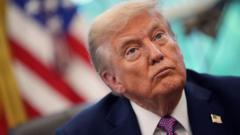Will Venezuela's Jets Face US Firepower?

Published: 2025-09-06 10:27:02 | Category: world
The ongoing tensions between the United States and Venezuela have escalated recently, with President Donald Trump issuing stark warnings about the potential consequences of Venezuelan military actions near US naval vessels. This situation follows a series of provocative incidents involving Venezuelan jets and US naval ships, highlighting the fragile state of relations between the two nations.
Last updated: 27 October 2023 (BST)
Key Takeaways
- Trump has warned that Venezuelan jets flying near US naval vessels may be shot down.
- The US military has increased its presence in the Caribbean amid drug trafficking concerns.
- Maduro has denied US allegations and called for respect and dialogue.
- Trump has intensified anti-drug trafficking efforts since returning to office.
- The US has charged Maduro with serious crimes, including narco-terrorism.
Recent Incidents and Escalating Tensions
The recent warning from President Trump comes in the wake of two incidents where Venezuelan military aircraft flew dangerously close to US naval vessels operating off the coast of South America. This provocative behaviour has been met with strong rhetoric from the US, suggesting a readiness to respond militarily if necessary.
In his remarks, Trump made it clear that if Venezuelan jets were to pose a threat, the US would take decisive action. He stated, "If they put us in a dangerous position, they'll be shot down." This statement underscores the growing concern within the US government regarding the activities of the Venezuelan military.
US Military Response and Strategy
In response to the perceived threats from Venezuela, the US has bolstered its military presence in the Caribbean. This includes the deployment of additional naval vessels and the mobilization of thousands of Marines and sailors. The White House has also announced the transfer of ten F-35 fighter jets to Puerto Rico, enhancing the US's aerial capabilities in the region.
Trump has framed these military actions as part of a broader strategy to combat drug trafficking, which he claims is heavily linked to Venezuelan operations. He has warned that "drugs are pouring" into the US from Venezuela, fuelling concerns about public safety and health in America.
Venezuelan Perspective and Maduro's Response
In contrast, Venezuelan President Nicolás Maduro has rejected the US's accusations, asserting that they are unfounded and that the political differences between the two countries do not warrant military conflict. Maduro has expressed a willingness to engage in dialogue, provided that the US respects Venezuela's sovereignty.
This ongoing war of words reflects a deep-seated animosity between the two leaders, particularly since Trump's administration has consistently labelled Maduro as a significant threat. Trump has previously doubled the reward for information leading to Maduro's arrest, now set at £37.2 million, further indicating the US's intent to hold him accountable for alleged crimes.
Historical Context and Implications
The strained relations between the US and Venezuela have deep historical roots, with issues of human rights, economic sanctions, and political legitimacy at the forefront. The US has long accused Maduro's government of corruption and repression, while Maduro has portrayed the US as an imperialist force seeking to destabilise Venezuela.
Since Trump's return to office in January, there has been a notable shift in US policy towards Latin America, with an intensified focus on combating drug trafficking. This has included not only military measures but also diplomatic efforts to rally support from other nations in the region against Maduro's regime.
The Role of Drug Trafficking in US-Venezuela Relations
Drug trafficking has emerged as a central theme in the US's narrative against Venezuela. Trump's administration has accused Maduro of facilitating drug trade operations, linking him to the Tren de Aragua, a gang designated as a terrorist organisation in the US. This framing serves to bolster the justification for increased military presence in the region.
Statistics on drug trafficking from Latin America show a troubling increase in the flow of narcotics into the United States, with Venezuelan routes becoming increasingly significant. In recent years, US authorities have reported a spike in drug-related incidents, prompting calls for more stringent measures to combat the crisis.
Looking Ahead: What Happens Next?
The current situation presents several potential pathways. The US may continue to escalate its military presence, which could provoke further confrontations with Venezuela. Alternatively, diplomatic channels could be explored, although both leaders have expressed reluctance to engage in meaningful dialogue.
The international community will be closely watching these developments, as the implications of a military conflict could extend beyond just the US and Venezuela, impacting regional stability in South America.
Conclusion
The ongoing tensions between the United States and Venezuela highlight the complexities of international relations, particularly in the context of drug trafficking and military posturing. As both nations grapple with their respective challenges, the potential for further escalation remains a pressing concern. How the US and Venezuela navigate this precarious situation will have lasting implications for both countries and the wider region.
What steps do you think should be taken to de-escalate tensions between the US and Venezuela? #USVenezuelaRelations #MilitaryTensions #DrugTrafficking
FAQs
What triggered the recent tensions between the US and Venezuela?
The tensions were triggered by Venezuelan military aircraft flying close to US naval vessels, prompting warnings from President Trump about potential military action.
What military actions is the US taking in response?
The US has increased its military presence in the Caribbean, deploying additional naval vessels and sending F-35 fighter jets to Puerto Rico.
How has President Maduro responded to US allegations?
President Maduro has denied US allegations, claiming they are unfounded and insisting on the need for respect and dialogue between the two nations.
What role does drug trafficking play in this conflict?
Drug trafficking is a central theme in the conflict, with the US accusing Maduro of facilitating drug trade operations and linking him to organised crime.
What are the potential consequences of military escalation?
Military escalation could lead to direct confrontations, further destabilising the region and impacting international relations in Latin America.



